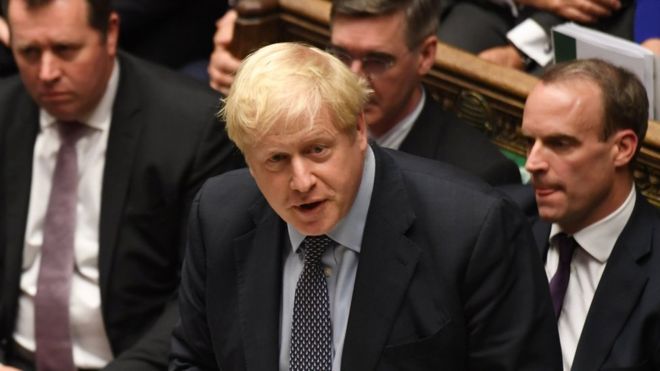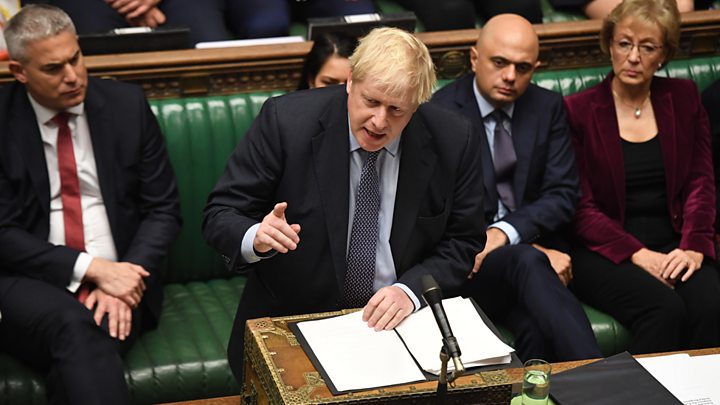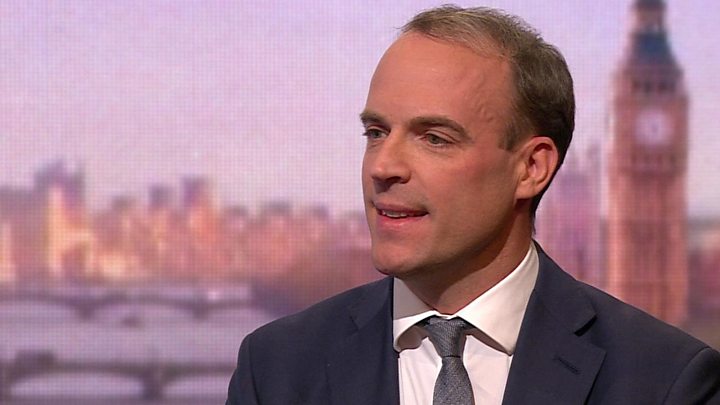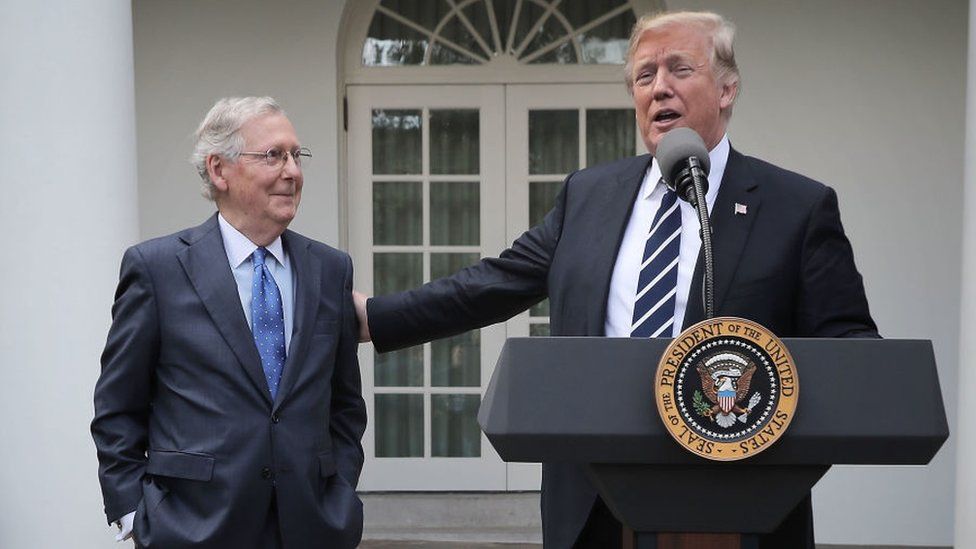Brexit: No 10 to push again for vote on Boris Johnson’s deal


MPs must be given “a straight up-and-down vote” on the PM’s Brexit deal later, No 10 says, but it is not clear whether the Speaker will allow it.
John Bercow is due to announce his decision at about 15:30 BST.
The PM tried to bring his deal to the Commons for a vote on Saturday, but his strategy was dealt a blow when MPs backed moves to delay approval instead.
The Speaker has previously ruled out repeatedly bringing back votes on the same matter more than once.
BBC assistant political editor Norman Smith said Mr Bercow looked set to reject the PM’s demand.
Following Saturday’s special sitting, and under the Benn Act, Boris Johnson was forced to send a letter asking the EU for an extension to the Brexit date – although he did not sign it.
Brexit legislation
Mr Johnson reached a new deal with the EU last week, but it needs to be approved by the UK Parliament – he wants MPs to say a clear “yes” or “no” to that on Monday afternoon.
The legislation which would implement Brexit – called the Withdrawal Agreement Bill (WAB) – will also be introduced on Monday and must begin the process of parliamentary scrutiny.
Labour’s shadow Brexit Secretary Keir Starmer has said his party will push for changes when the bill is brought to Parliament, for example, demanding a UK-wide customs union with the EU and single market alignment, and backing moves to put the deal to a referendum.
The DUP has so far refused to support Mr Johnson’s deal – and Labour has attempted to reach out to it – but the Northern Irish party’s chief whip, Jim Shannon, told Sky News a customs union was “something that we cannot support and will not support”.
He said the party was meeting to discuss its strategy, but added: “I believe that will be the stance we will have later on when we see the wording.”
The prime minister’s spokesman has reiterated the government’s opposition to a customs union and another referendum, saying: “Both of those have been voted on on a number of occasions in the House of Commons and neither have been successful.”
Boris Johnson’s Brexit deal
The prime minister’s deal ditches the backstop – the controversial “insurance policy” designed to prevent a return to physical checks on the Irish border.
Instead it will, in effect, draw a new customs border in the Irish Sea, because goods which could then travel onwards to Ireland will have to pay a duty tax.
The whole of the UK will leave the EU customs union, meaning it could strike trade deals with other countries in the future.
The EU is now considering how to respond to the UK’s request for a delay, but has said Saturday’s developments did not mean that the deal had been rejected.
The UK is due to leave the EU in 10 days time.
So what happens now?
On Saturday, instead of answering the question, “Do you support the deal or not?” MPs effectively chose to change the question, backing the so-called Letwin amendment instead, which delays approval for the deal until the WAB is passed.
Chief Secretary to the Treasury Rishi Sunak said he “very much hoped” the Speaker would allow the government a second chance to get MPs to give a straightforward “yes” or “no”.
“What the Oliver Letwin amendment did is mean that Parliament hasn’t given its explicit positive support for the deal,” Mr Sunak told BBC Radio 4’s Today programme.
“It was an observation on the deal happening and I think what people need is a substantive vote.”
Former Conservative minister, now independent MP, Justine Greening said the proper process through Parliament had to be followed in order for the WAB – a “huge bill” – to be given sufficient scrutiny.
“We all know that rushed law is bad law, this is the political rewiring of our country and it has to be done properly,” she told the BBC.
But Mr Sunak said: “The substance of the withdrawal agreement has been public for a very long time, the bits that have changed – the backstop and the political declaration – were published last week.
“Parliament has shown time and time again… an ability to move very quickly when it wants to. We can sit late sit, at weekends. And that’s of course what we should do.”


A straight vote on the deal today seems unlikely because the government didn’t pull the vote on Saturday – they walked away from it. So, theoretically, the Commons did give a view on the issue, and it can’t be asked to give a different one today – let’s see.
The government is desperate to have a vote on the whole shebang as soon as possible to show momentum, before getting into days of scrutiny where MPs will try to make changes to the deal.
That’s not just because they are worried about losing more votes – this government has barely won any – but because if MPs make any major changes to the legislation, then it might mean PM has to go back to EU and ask for a different deal – you can imagine how much No 10 wants that.
It also, of course, eats up time, making it harder and harder as the hours tick by for the government to be able to stick to the 31 October deadline – still not impossible, but looking increasingly unlikely.
If the WAB ends up not getting through or being changed, there is very little chance the government will be able to avoid a delay, so the smart bet is that No 10 will just go back to pushing very hard for an election.
Once a delay is agreed, it will be hard for opposition parties to block one – lots of individual MPs don’t want it, but the government is prepared to hold a vote of no confidence in itself, or go for a simple majority vote if they can’t get it through under the Fixed-term Parliaments Act’s two-thirds bar.
What is the Withdrawal Agreement Bill?
The UK needs to pass a law to implement the withdrawal agreement – the part of the PM’s Brexit deal that will take the country out of the EU – in UK law.
It has to secure the backing of a majority of MPs – and then of peers in the House of Lords. And a vote for the Brexit deal itself is no guarantee of a vote for the legislation required to implement it.
The bill gives legal effect to the withdrawal deal, as well as any agreed transition period, and fulfils requirements on the rights of EU citizens in the UK after Brexit. It will also allow ministers to make “divorce payments” to the EU foreseen under the current deal.
MPs will be able to vote on amendments – changes or add-ons – to the bill.
If the government cannot get the bill through Parliament the default legal position is that the UK cannot ratify the deal, and so would leave on 31 October without a deal. However, that is dependent on no extension beyond that date having been already agreed with the EU.
Why did the PM ask for an extension?
Passing the Letwin amendment meant the Benn Act was triggered because Parliament had not approved a deal – or approved no-deal – by the law’s 19 October deadline.

That meant Mr Johnson had to send an extension request to Brussels, which he did, but left it unsigned – and accompanied it with a second, signed letter which said he believed a delay would be a mistake.
On Sunday, ministers insisted the government believed it still had sufficient support in the Commons to pass the deal and remained committed to a 31 October departure.
The Cabinet Office, meanwhile, has triggered Operation Yellowhammer – its contingency plan to handle a no-deal Brexit – because it said there was no guarantee the EU would grant an extension.
What is happening in the courts?
Scotland’s highest court has delayed a decision on whether the prime minister fully complied with the Benn Act.
The Court of Session was originally asked earlier this month to consider using “nobile officium” powers to request a Brexit extension on the prime minister’s behalf – but the judges delayed making a ruling until the political situation become clearer.
The UK government argued it had fulfilled its legal obligations, but on Monday, Lord Carloway said the case should be continued until those obligations had been complied with in full.
BBC





